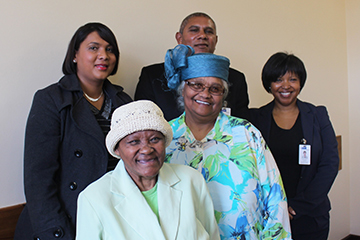World Mental Health Day 2015
 Treatment for mental health issues should be handled professionally and in a caring environment. It’s important to treat mental health like any other health issue you or your loved ones may have. Find professional help, advice and treatment from a number of support groups and organisations to manage your mental wellbeing.
Treatment for mental health issues should be handled professionally and in a caring environment. It’s important to treat mental health like any other health issue you or your loved ones may have. Find professional help, advice and treatment from a number of support groups and organisations to manage your mental wellbeing.
World Mental Health Day is celebrated on 10 October. The international theme for 2015 is "Dignity in mental health".
What is mental health?
Mental health is not merely about the absence of mental illness or mental impairment, but rather the presence of mental health and well-being. Mental health is about how you feel about yourself, realising your own potential, how you relate to others and how you deal with the opportunities, difficulties and challenges of everyday life.
What is dignity?
According to the World Health Organization (WHO) dignity refers to an individual’s inherent value and worth and is strongly linked to respect, recognition, self-worth and the opportunity to make choices. Being able to live a life with dignity stems from the respect of basic human rights including:
- freedom from violence and abuse,
- freedom from discrimination,
- autonomy and self-determination,
- inclusion in community life, and
- participation in policy-making.
What is mental illness?
Mental illness or impairment is a treatable condition of the brain, mind and emotions that may affect the way a person thinks, feels or behaves. Mental disorder includes a broad range of problems with different symptoms. However, these are generally characterised by some combination of abnormal thoughts, emotions, behaviour and relationships with others. Examples of these are: schizophrenia, depression, mental retardation and disorders due to drug abuse. Most of these disorders can be successfully treated.
Issues facing people with mental illness
The main issues facing people with mental illness is discrimination and stigma due to the general lack of understanding into mental health issues. People with mental health problems face poverty, homelessness and unemployment due to discrimination in the workplace. (The Guardian, 2004).
Apart from the difficulties arising directly from their mental illness, there is a wide variety of other issues which mentally impaired people are also faced with, these include the following:
- Difficulties in obtaining the right diagnosis and treatment, as these illnesses are poorly recognised and resources for mental healthcare have been historically underfunded.
- Difficulties in being accepted in society due to stigmas and stereotypes associated with mental illness.
- Difficulties in finding work due either to the symptoms of the illness which may make it difficult to perform the function of work, or due to negative and unfounded perceptions of people who live with mental illness.
- Difficulties in finding accommodation.
- Difficulties in relating to others who may not understand how the illness affects them.
- Difficulties in having these various issues addressed due to the disempowering nature of society's response to people living with mental impairment.
- Despite all of this, most people who experience mental illness will, if given the right support, be able to recover sufficiently to be able to live, work, learn and participate fully in their communities.
What help is there for people with mental health problems?

Help is available from a wide variety of professionals, including counsellors, nursing practitioners, social workers, occupational therapists, psychologists, general practitioners and psychiatrists.
This may involve a range of treatments including occupational and behaviour interventions, assistance from family members, counselling and other "talking therapies" and medications, to name but a few.
Help can be obtained through your local clinic or general practitioner who will be able to recommend specialists. The Western Cape Government facilities that offer services to people with mental health problems are: Community Health Centres, District Hospitals and Psychiatric Hospitals.
View the symptoms of mental illness.
Who to Contact
Contact these Provincial Mental Health Services:
|
Provincial Mental Health Services |
|
|
Groote Schuur Hospital |
Tel: 021 404 2175/ 51 |
|
Tygerberg Hospital |
Tel: 021 938 5120 |
|
Valkenberg Hospital |
Tel: 021 440 3111 |
|
Lentegeur Hospital |
Tel: 021 370 1111 |
|
Stikland Hospital |
Tel: 021 940 4400 |
|
Alexandra Hospital |
Tel: 021 503 5000 |
You can also contact these support groups for mental illnesses or problems:
|
Support Groups for Mental Illnesses |
|
|
Anxiety Disorder Clinic (Assessment and treatment for people from all areas with anxiety disorders). |
Tel: 021 940 4442/ 3 or 021 940 4555 |
|
Depression and Anxiety Disorders Support Group (The group has a network of support across South Africa). |
Tel: 011 783 1474/ 76 or 011 884 1797 |
|
Reach Out (This organisation is a support group for people living with depression). |
Tel: 088 120 4136 |
|
Cape Support for Mental Health (Support for families of people with schizophrenia or bipolar disorder). |
Tel: 021 448 0760 |
|
Support Group for Obsessive/Compulsive Disorder. |
Tel: 021 671 2519 |
|
Western Cape Bipolar Association (Support and information on manic depression). |
Cell: 082 855 3180 |
 |
| From back left: Rose Parent Valecia De Beer Swano, who cares for six Rose patients Vincent Weeder, Social Work Supervisor and Estelle Silence, Social Worker Manager at Lentegeur Hospital. Front from left is Saartije, a Rose patient who has been in the car |
Get involved with the Rose Parent Project
A good example of community participation is the Rose Parent Project, a community-based foster care programme providing living options for institutionalised psychiatric and intellectually disabled clients of Lentegeur Hospital.
The Lentegeur Hospital Rose Parent Project has been in existence for more than 27 years. To date, more than 200 patients have been placed with over 100 families in 14 suburbs around Cape Town. There is no other hospital project of this magnitude that is managed by the community and sustained without any financial support or compensation.
Mental health clients in the care of the Rose Parents seldom require re-admission to Lentegeur Hospital and many have successfully rekindled relationships with their family members.
“The Rose Parent Project is proof of the success of the government and the community partnering to take care of those in need. Such partnerships are invaluable and citizens in the Western Cape are urged to get involved in their communities to provide assistance where their capacity allows. The success this project has seen is a strong indicator that persons with mental illness do not always need to be institutionalised and that their best chance at recovery is being in a caring environment,” concludes Estelle Silence.
For more information on the Rose Parent Project and details on how to become a parent please contact Estelle Silence, Social Work Manager at Lentegeur Hospital via email: Estelle.Silence@westerncape.gov.za or call Vincent Weeder, Social Work Supervisor on 021 370 1111.


